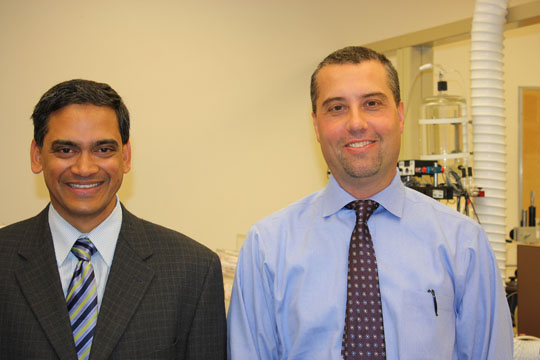Listen to the UVA Today Radio Show report on this story by Jane Ford:
December 21, 2010 — Researchers at the University of Virginia School of Medicine have discovered a key protein involved in sperm production in mammals, with potential implications for fertility, autoimmune diseases of the testes and testicular cancers.
Writing in the Sept. 16 issue of the journal Nature, senior authors Kodi S. Ravichandran, chair of the Department of Microbiology, and Jeffrey J. Lysiak, assistant professor of urology, found that the ELMO1 protein is needed for the proper removal of dead or dying immature sperm cells from the testes and that this process is critical for maintaining the normal healthy status of the testes.
"Phagocytes are cells whose responsibility is to clear dead or dying cells from the body, and ELMO1 is an essential protein in this process. This is a crucial natural process, as about 200 billion cells die in our bodies every day," Lysiak said. "If these cells are not cleared, there can be inflammation, autoimmune diseases and a general disruption of the cycle of new cell development."
The development of new sperm in the testes (spermatogenesis) is a highly complex and carefully orchestrated process. Immature germ cells are guided through the developmental process with the help of specialized "nurse" cells called Sertoli cells. As a unique type of phagocyte, a major role of Sertoli cells is to remove the germ cells that fail to develop properly and ultimately die. Spermatogenesis is a "very wasteful" process Lysiak said, with up to 75 percent of all germ cells dying before they can fully develop into sperm.
The Ravichandran laboratory originally identified ELMO1 as a key player in the clearance of dying cells from worm to human. These new findings show that the ELMO1 protein is needed by Sertoli cells in order to clear the dying, excess or defective developing germ cells.
"I believe these studies bring together how we turn over cells in the body to the key biological process of spermatogenesis in the testes," Ravichandran said. "The implications of these studies are twofold: first, for the basic biology of homeostasis in a tissue and how we balance cells that die and cells that live; second, the understanding from these studies could be beneficial for future therapies targeting male infertility in couples wanting to have children."
December 21, 2010 — Researchers at the University of Virginia School of Medicine have discovered a key protein involved in sperm production in mammals, with potential implications for fertility, autoimmune diseases of the testes and testicular cancers.
Writing in the Sept. 16 issue of the journal Nature, senior authors Kodi S. Ravichandran, chair of the Department of Microbiology, and Jeffrey J. Lysiak, assistant professor of urology, found that the ELMO1 protein is needed for the proper removal of dead or dying immature sperm cells from the testes and that this process is critical for maintaining the normal healthy status of the testes.
"Phagocytes are cells whose responsibility is to clear dead or dying cells from the body, and ELMO1 is an essential protein in this process. This is a crucial natural process, as about 200 billion cells die in our bodies every day," Lysiak said. "If these cells are not cleared, there can be inflammation, autoimmune diseases and a general disruption of the cycle of new cell development."
The development of new sperm in the testes (spermatogenesis) is a highly complex and carefully orchestrated process. Immature germ cells are guided through the developmental process with the help of specialized "nurse" cells called Sertoli cells. As a unique type of phagocyte, a major role of Sertoli cells is to remove the germ cells that fail to develop properly and ultimately die. Spermatogenesis is a "very wasteful" process Lysiak said, with up to 75 percent of all germ cells dying before they can fully develop into sperm.
The Ravichandran laboratory originally identified ELMO1 as a key player in the clearance of dying cells from worm to human. These new findings show that the ELMO1 protein is needed by Sertoli cells in order to clear the dying, excess or defective developing germ cells.
"I believe these studies bring together how we turn over cells in the body to the key biological process of spermatogenesis in the testes," Ravichandran said. "The implications of these studies are twofold: first, for the basic biology of homeostasis in a tissue and how we balance cells that die and cells that live; second, the understanding from these studies could be beneficial for future therapies targeting male infertility in couples wanting to have children."
Media Contact
Article Information
December 21, 2010
/content/uva-researchers-key-discovery-provides-new-insights-male-fertility

